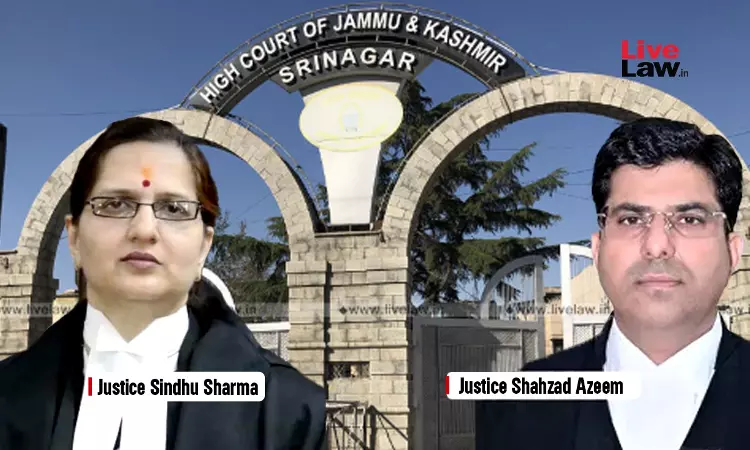- Home
- /
- High Courts
- /
- High Court of J & K and Ladakh
- /
- General Clauses Act | Notice Is...
General Clauses Act | Notice Is Deemed To Be Served Once Properly Addressed & Dispatched: J&K&L High Court Reiterates
LIVELAW NEWS NETWORK
13 Oct 2025 12:50 PM IST
The High Court of Jammu & Kashmir and Ladakh has upheld the dismissal of a Border Security Force (BSF) Constable while reaffirming that once a notice is properly addressed and dispatched by registered post, it is deemed to have been duly served under Section 27 of the General Clauses Act, 1897. The burden lies on the addressee to prove non-receipt, and courts cannot presume non-service...
The High Court of Jammu & Kashmir and Ladakh has upheld the dismissal of a Border Security Force (BSF) Constable while reaffirming that once a notice is properly addressed and dispatched by registered post, it is deemed to have been duly served under Section 27 of the General Clauses Act, 1897. The burden lies on the addressee to prove non-receipt, and courts cannot presume non-service merely because acknowledgment is not produced, the Court ruled.
The judgment, delivered by a Division Bench of Justices Sindhu Sharma and Shahzad Azeem (authoring) thus set aside the Single Judge's order that had quashed the constable's dismissal and restored the action of the BSF authorities.
Background of the Case
The case stemmed from disciplinary proceedings initiated against Constable Mohammad Shafi Khan of the 193 Battalion, BSF, who proceeded on one day's casual leave, but failed to rejoin duty thereafter. Despite multiple registered notices, apprehension rolls, and show cause communications, Khan neither reported back nor replied to the official correspondence.
A Court of Inquiry was convened under Section 62 of the BSF Act, 1968, and after repeated non-compliance, the Commandant, exercising powers under Section 11(2) of the BSF Act read with Rule 177 of the BSF Rules, 1969, issued an order of dismissal.
Khan challenged his dismissal before the Writ Court, alleging violation of Article 311 of the Constitution and principles of natural justice, claiming he had never been informed of any inquiry or proceedings. The Single Judge accepted his plea and quashed the dismissal. The Union of India and BSF subsequently preferred an intra-court appeal, asserting that all legal requirements had been fulfilled and that the respondent had, in fact, admitted receipt of BSF communications in his own representation.
Observations of the Bench
Justice Shahzad Azeem, writing for the Bench, reviewed the entire record and found that the BSF authorities had scrupulously complied with the procedural requirements under the BSF Act and Rules. The Court noted that the constable was a habitual absentee, and every effort had been made to secure his presence and obtain his response before passing the order of dismissal.
It was observed that show cause notices dated May 4, 2004, and June 28, 2004, were issued to the constable under Rule 22(2) of the BSF Rules, providing him thirty days to submit his explanation. These notices were dispatched through registered post with acknowledgment due.
Crucially, the Court relied on the respondent's own petition under Rule 28-A of the BSF Rules, wherein he admitted having received communications from the BSF, including the one informing him of his dismissal. The Bench held that this admission nullified his claim that the order was passed behind his back.
The Court underscored that the presumption of service under Section 27 of the General Clauses Act applies once a notice is correctly addressed and sent by registered post. Justice Azeem observed,
“When a notice is sent to the proper address by registered post, and neither the unserved notice nor the acknowledgment card is received, a presumption of due service arises. The burden then lies on the addressee to prove that the notice was not delivered to him.”
The Bench ruled that the Writ Court had wrongly assumed non-service merely because postal receipts were not produced, despite clear evidence of dispatch and the respondent's own acknowledgment. The Division Bench held that judicial presumption cannot be displaced by conjecture, especially where the recipient admits having received communications.
On the Independence of Power of Dismissal of the Command Under the BSF Act the Court held that the Commandant of a BSF Unit has the independent power under Section 11(2) of the Act read with Rule 177 of the BSF Rules to dismiss personnel under his command, even without trial by the Security Force Court. Citing the Supreme Court precedent in Sri Gouranga Chakraborty v. State of Tripura (AIR 1989 SC 1321), the Bench emphasized that if an opportunity to explain is given and not availed, the principles of natural justice are not violated.
Justice Azeem further observed that the principles of natural justice are inherent in the BSF disciplinary framework, and once the delinquent is given a fair chance to respond, his failure to do so cannot render the proceedings invalid.
The Division Bench censured the respondent for approaching the Court with unclean hands, noting that he suppressed material facts and distorted the record to mislead the Writ Court. The court stated that a litigant seeking equitable relief must present the truth candidly, and one who misleads the court forfeits the right to relief.
It was also held that the respondent deliberately evaded service and absconded, rendering the non-execution of the warrant inconsequential. His conduct, the Court observed, was “indicative of a conscious attempt to evade the process of law.”
Allowing the appeal, the Division Bench thus set aside the Single Judge's order and upheld the BSF's dismissal order concluding that the action was lawful, procedurally sound, and in conformity with natural justice.
Case Title: Union Of India Vs Mohammad Shafi Khan
Click Here To Read/Download Judgment



